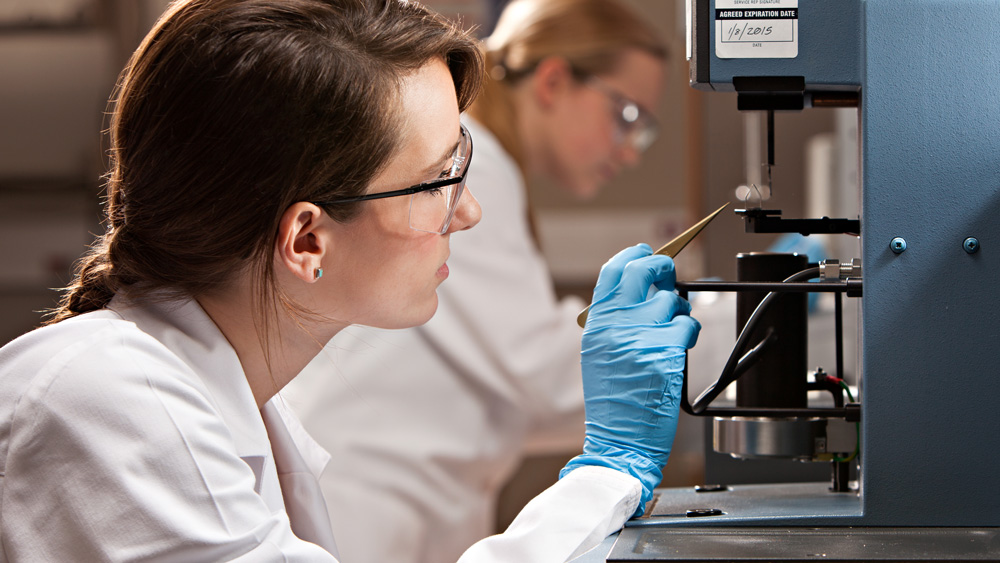
Many biomedical engineering students at Texas A&M University work on research that could impact people’s lives, so it’s not uncommon to see students or graduates in this major come up with innovative and marketable ideas. Two of these Aggies took their inventions to a competition tailor-made to help them succeed with their entrepreneurial goals.
In 2022, senior Haley Clark and former student Madi Heck ’21 promoted their ideas at Aggie PITCH, a Texas A&M University-wide competition encouraging the engagement and promotion of businesses and product innovations with potential investors, mentors and partners.
The contest has three divisions: full pitches for current students, full pitches for former students, and elevator pitches for both. Clark competed in the current student full pitch and won third place. Heck competed — with her business partner Mark Golla ’22 — in the former student full pitch, also winning third place.
Both women had positive things to say about the advantages of creating, competing and inventing with a biomedical engineering background.
Courses promote versatility
Clark’s entrepreneurial journey began with a membership in Engineering Inc. in the College of Engineering at Texas A&M. She conducted a customer discovery interview there and found out tampon leakage wasn’t just her problem. When she engineered a better way of controlling and managing menstruation blood flow, a professor encouraged her to apply for Aggie PITCH.
During the competition, Clark had the opportunity to discuss her design’s basic principles and feasibility with an engineer working on feminine hygiene products at the Procter and Gamble company.
“They were pretty excited,” Clark said.
Clark is using the $3,500 she won to prototype her product. Depending on how much she spends, she may be able to use the rest to fund a patent application.
She credits her major's versatility with her product's potential success.
“There are a lot of different sides to biomedical engineering,” Clark said. “We take electrical, mechanical and broad-spectrum engineering classes combined with medical sciences. We also take anatomy and physiology, which helped me understand the uterus and the general principles of blood flow.”
Clark was recently accepted into Texas A&M’s School of Engineering Medicine, a collaboration between the College of Engineering, the College of Medicine and the Houston Methodist Hospital. The program offers Clark the perfect environment for encouraging medical invention while learning physician skills.
Advanced degrees focus application
Heck graduated in December 2021 with master’s degrees in biomedical engineering and business administration. She is currently the CEO of SageSpectra, a company founded on the device she and Golla introduced at Aggie PITCH. Their creation is a low-cost device that quickly measures tissue oxygen saturation, a key indicator of tissue health.
“We wanted to target the early detection of peripheral artery disease, or PAD,” said Heck. “PAD occurs when narrowed vessels traveling from the heart to the legs result in reduced blood supply to the extremities.”
Approximately 20 million people in the U.S. have PAD, yet it remains highly underdiagnosed. When left untreated, PAD can progress to critical limb ischemia, where the blood supply is severely reduced or even blocked, causing ulcers and, in extreme cases, tissue death requiring amputation.
“Our primary goal is to increase access to PAD screening for at-risk individuals and communities,” said Heck. “A more comprehensive cohort of patients can be screened right in their homes or primary care offices with a low-cost, portable device.”
Through market research and networking, Heck and Golla discovered their device could also serve other health needs, such as grading pressure ulcers, monitoring peripheral fluid flow, and even assessing tissue and organ fluid flow for robotic surgery.
Entrepreneurial programs available
Aggie PITCH has become a critical networking event in the last five years — a competition where Aggie entrepreneurial ecosystem members connect with and show support for each other. All majors and industries with all stages of startups can apply. The thousands of dollars awarded as prizes have funded further research, prototypes, business startups and patent applications. Plus, students and teams who compete at Aggie PITCH as finalists become part of an exclusive group of startup business founders able to represent Texas A&M at national and global entrepreneurial competitions.
Aggie PITCH is one of four competitions in the McFerrin Center for Entrepreneurship and one of several programs open to students and former students hoping to change the world one idea at a time.